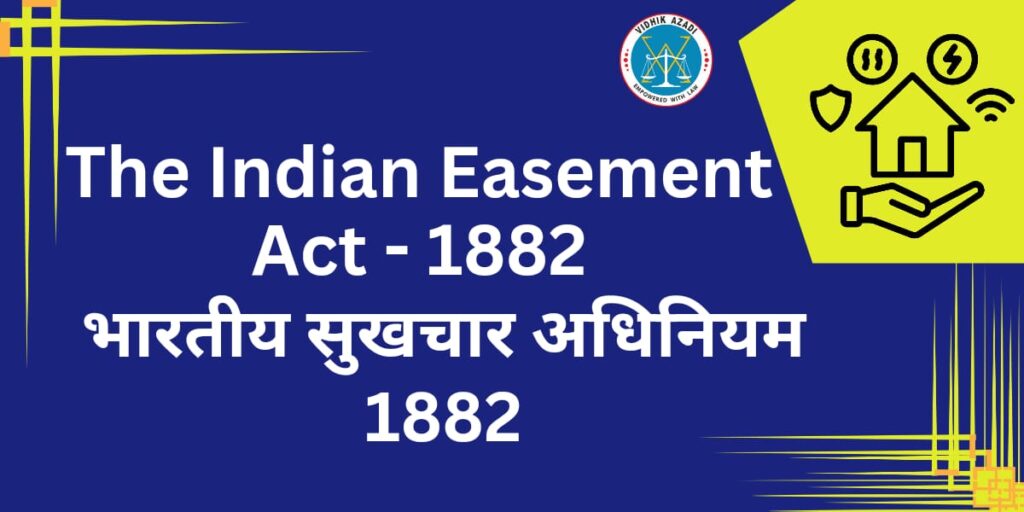Easement Act

Easement Act
The Easements Act, 1882, governs the laws related to easements in India. An easement is a right that the owner of a property (the dominant tenement) has to use another’s property (the servient tenement) for a specific purpose. Easements can include rights such as the right of way, the right to light and air, and the right to use water from a neighboring property. An easement is a right which the owner or occupier of certain land possesses, as such, for the beneficial enjoyment of that land, to do and continue to do something, or to prevent and continue to prevent something being done, in or upon, or in respect of, certain other land not his own.
Easements can be created in several ways such as by grant, by prescription, by implied grant and by custom. Essential elements of easements are Dominant and Servient Tenements, which must be owned by different people. The easement must be for the beneficial enjoyment of the dominant tenement. The easement must be for a specific use, such as a right of way or right to light. The dominant owner has the right to use the easement as specified. It has the right to enter the servient tenement to repair and maintain the easement. The dominant owner must use the easement reasonably without causing undue harm to the servient tenement. The servient owner retains the right to use their property in any way that does not interfere with the easement. The servient owner must not interfere with the dominant owner’s use of the easement.
The Easements Act, 1882, provides a comprehensive legal framework for the creation, enjoyment, and extinguishment of easements in India. Easements play a crucial role in property rights and the utilization of land, ensuring that property owners can effectively manage and use their properties while balancing the rights and responsibilities of neighboring landowners. Understanding the provisions of the Easements Act is essential for property owners, legal professionals, and anyone involved in real estate and land use.
भारतीय सुखचार अधिनियम
भारतीय निर्बंधन अधिनियम, 1882, भारत में निर्बंधन (Easements) से संबंधित कानूनों को नियंत्रित करता है। एक निर्बंधन एक अधिकार है जो किसी संपत्ति के मालिक (प्रमुख भूमि) को दूसरी संपत्ति (सेवक भूमि) का एक विशिष्ट उद्देश्य के लिए उपयोग करने की अनुमति देता है। यह अधिकार विभिन्न प्रकार के हो सकते हैं, जैसे मार्ग का अधिकार, प्रकाश और वायु का अधिकार, और पड़ोसी संपत्ति से पानी का उपयोग करने का अधिकार। एक निर्बंधन वह अधिकार है जिसे किसी भूमि का मालिक या अधिवासी, उस भूमि के लाभकारी उपयोग के लिए, किसी अन्य भूमि पर कुछ करने या कुछ करने से रोकने के अधिकार के रूप में रखता है।
निर्बंधन कई तरीकों से बनाए जा सकते हैं जैसे अनुदान द्वारा, अनाधिकार ग्रहण द्वारा, सांकेतिक अनुदान द्वारा और रिवाज द्वारा। निर्बंधन के तहत दो संपत्तियों का होना आवश्यक है, जिसमें एक को लाभ होता है (प्रमुख भूमि) और दूसरी पर भार होता है (सेवक भूमि)। प्रमुख और सेवक भूमि अलग-अलग लोगों के स्वामित्व में होनी चाहिए। निर्बंधन प्रमुख भूमि के लाभकारी उपयोग के लिए होना चाहिए। निर्बंधन एक विशिष्ट उपयोग के लिए होना चाहिए, जैसे मार्ग का अधिकार या प्रकाश का अधिकार। प्रमुख मालिक को निर्दिष्ट अनुसार निर्बंधन का उपयोग करने का अधिकार है। प्रमुख मालिक को सेवक भूमि में प्रवेश करने और निर्बंधन की मरम्मत और रखरखाव का अधिकार है। प्रमुख मालिक को निर्बंधन का उपयोग युक्तिसंगत रूप से करना चाहिए, बिना सेवक भूमि को अनावश्यक नुकसान पहुँचाए। सेवक मालिक को अपनी संपत्ति का उपयोग करने का अधिकार है, जब तक कि वह निर्बंधन में हस्तक्षेप न करे। सेवक मालिक को प्रमुख मालिक के निर्बंधन के उपयोग में हस्तक्षेप नहीं करना चाहिए।
भारतीय निर्बंधन अधिनियम, 1882, भारत में निर्बंधनों की सृष्टि, उपभोग और समाप्ति के लिए एक व्यापक कानूनी ढांचा प्रदान करता है। निर्बंधन संपत्ति अधिकारों और भूमि के उपयोग में महत्वपूर्ण भूमिका निभाते हैं, जिससे संपत्ति मालिक अपनी संपत्तियों का प्रभावी ढंग से प्रबंधन और उपयोग कर सकें। निर्बंधन अधिनियम के प्रावधानों को समझना संपत्ति मालिकों, कानूनी पेशेवरों, और रियल एस्टेट और भूमि उपयोग में शामिल किसी भी व्यक्ति के लिए आवश्यक है।
